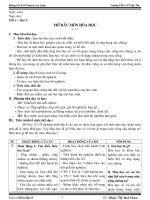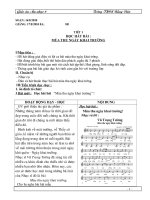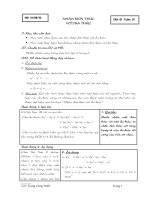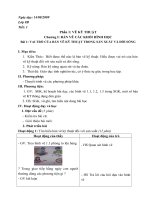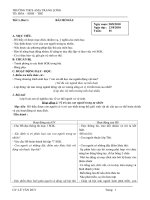anh 8 : chuan kien thuc
Bạn đang xem bản rút gọn của tài liệu. Xem và tải ngay bản đầy đủ của tài liệu tại đây (231.97 KB, 32 trang )
Bộ giáo dục và đào tạo
Hớng dẫn
Thực hiện chuẩn kiến thức, k năng của
chơng trình giáo DC phổ thông
Môn tiếng Anh - Lớp 8
1
Lời giới thiệu
2
Phần thứ nhất:
GIỚI THIỆU CHUNG VỀ CHUẨN KIẾN THỨC, KỸ NĂNG
3
Phần thứ hai:
HƯỚNG DẪN THỰC HIỆN CHUẨN KIẾN THỨC, KỸ NĂNG CỦA
CHƯƠNG TRÌNH LỚP 8
4
A. Khái quát về các chủ đIM
Chơng trình môn Tiếng Anh trung học đợc xây dựng dựa vào quan điểm chủ
điểm. Các chủ điểm giao tiếp đợc coi là cơ sở lựa chọn nội dung giao tiếp và
các hoạt động giao tiếp, qua đó chi phối việc lựa chọn, sắp xếp nội dung ngữ
liệu. Sáu chủ điểm xuyên suốt chơng trình là:
1. Personal information
2. Education
3.Community
4. Nature
5. Recreation
6. People and places
B. Khái quát về mức độ cần đạt
Hết lớp 8, học sinh có khả năng sử dụng những kiến thức tiếng Anh
đã học trong phạm vi chơng trình để:
Nghe:
Nghe hiểu đợc nội dung chính và nội dung chi tiết các
đoạn độc thoại / hội thoại trong phạm vi các nội dung chủ
điểm đã học trong chơng trình.
Hiểu đợc các có độ dài khoảng 80-100 từ ở tốc độ tơng
đối chậm.
Nói:
Hỏi - đáp, miêu tả, kể, giải thích về các thông tin liên quan
đến cá nhân các hoạt động học tập, sinh hoạt vui chơi,
giải trí.
5
Thực hiện một số chức năng giao tiếp cơ bản: thông báo,
trình bày, diễn đạt lời đề nghị, chấp nhận hoặc từ chối lời
đề nghị, diễn đatj lời hứa,...
Đọc:
Đọc hiểu đợc nội dung chính và nội dung chi tiết các văn
bản với độ dài khoảng 110-140 từ, xoay quanh các chủ
điểm có trong chơng trình.
Viết: Viết theo mẫu và có gợi ý đoạn văn có độ dài khoảng 60-80
từ về nội dung liên quan đến các chủ điểm đã học hoặc để
phục vụ các nhu cầu giao tiếp đơn giản nh viết th cám ơn,
viết lời mời,...
C. Hớng dẫn thực hiện chuẩn kiến thức, kĩ năng
Chủ điểm (Theme)1: personal information
Topics:
- Friends
- House and home
Speaking
Introduce people and respond to introductions
- Describe peoples appearance
- Make arrangements
- Talk about intentions
- Ask for and give reasons
- Talk about past events
Listening
Students will be able to:
6
Listen to monologues / dialogues within 100 words for general or
detailed information
Reading
Students will be able to:
Read dialogues and passages within 120-150 words for general or
detailed information
Writing
Students will be able to:
Write about oneself / others / a description of a room in the house
within 70-80 words using word cues / pictures
- Introduce people and respond to introductions
- Describe people’s appearance
- Make arrangements
- Talk about intentions
- Ask for and give reasons
- Talk about past events
Grammar:
- Present simple, Past simple
- Future with be going to
- Reflexive pronouns: yourself, myself, themselves
- Modal verbs: must, have to, ought to
- Adverbs of place: here, there, upstairs, downstairs, …
- Adjective + too / enough + to - infinitive
7
- Let’s
- Why, Because
Vocabulary:
- Words describing house and home: rug, armchair,
couch, oven, sink, cooker, …
- Names of telecommunication devices: fax machine,
mobile phone, …
- Words describing appearance: thin, tall, short, …
Chñ ®iÓm (Theme)2: Education
Topics:
- Our past
- School life and study habits
Speaking
Students will be able to:
- Ask for and respond to favors
- Give advice and instructions
- Express obligation
- Offer and respond to assistance
- Talk about study habits
- Talk about future plans
Listening
Students will be able to:
8
Listen to monologues / dialogues within 100 words for general or
detailed information
Reading
Students will be able to:
Read dialogues and passages within 120-150 words for general or detailed
information
Writing
Students will be able to:
- Write an informal letter within 70-80 words to a
friend
- Write about a future plan using suggested guidelines or questions
Grammar:
- Present simple with future meaning
- Reported speech: commands, requests and advice
- Modal verbs: may, can, could, should
- Adverbs of manner: well, fast, badly, hard, …
- Prepositions of time: in, on, at, after, before, between
- Tell / ask somebody to do something
- Like/hate/love doing something
- Used to do something
- Certainly / Of course
Vocabulary:
9
- Words to talk about study habits: semester, report,
examination, revise, learn by heart, …
- Words to talk about school life: care, take part in,
perform, look after, …
- Words to talk about future plans: play soccer, go
camping, cook meals, …
Chñ ®iÓm (Theme)3: Community
Topics:
- Shopping
- Neighborhood
- Country life and city life
Speaking
Students will be able to:
- Ask for information and assistance
- Talk about price, quantity and size
- Talk about differences / similarities
- Talk about future events and changes
Listening
Students will be able to:
Listen to a monologue / dialogue within 100 words for general or
detailed information
Reading
Students will be able to:
10
Read dialogues and passages within 120-150 words for general or
detailed information
Writing
Students will be able to:
- Write a letter to a friend about the neighborhood
- Write a community notice within 70-80 words using suggested
questions
Grammar:
- Tenses: Present perfect (with for and since), Present
progressive (to talk about the future / to show
changes), Future simple
- Adverbs: already, yet
- Comparisons: (not) as as; (not) the same as; …
different from
- Verbs to show changes: get, become
- Comparision of adjectives
Vocabulary:
- Words to talk about neighborhood: grocery store,
stadium, drugstore, …
- Words describing country / city life: traffic jam,
beautiful, quiet, clean, noisy, polluted, …
Chñ ®iÓm (Theme) 4: Health
Topics:
11
- First aid
- Healthy environment
Speaking
Students will be able to:
- Make suggestions
- Make and respond to formal requests, offers and
promises
- Give and respond to instructions
- Express personal feelings
Listening
Students will be able to:
Listen to a monologue / dialogue within 100 words for general or
detailed information
Reading
Students will be able to:
Read a dialogue / a passage within 120-150 words for general or
detailed information
Writing
Students will be able to:
Write a thank-you note / a set of instructions within 70-80 words using
suggested questions and pictures / word cues
Grammar:
- Future simple
12




